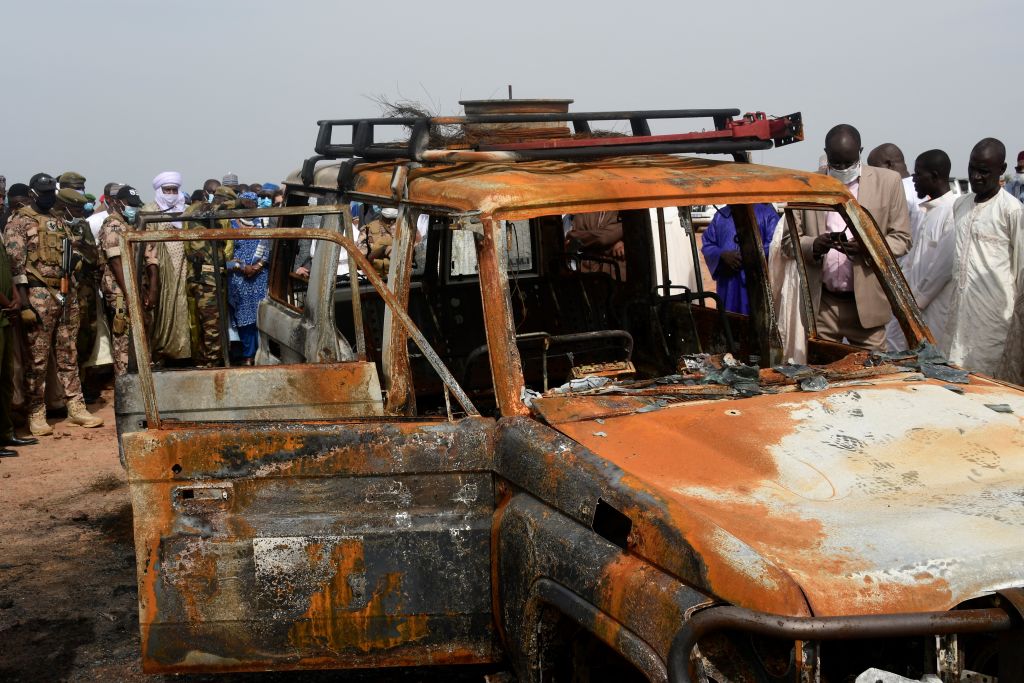Villagers gathered for evening prayers at the mosque in Manda, Niger, on June 20. Soon after, the killers arrived.
Terrorists affiliated with the Islamic State group (IS) slaughtered 70 worshippers at the mosque. The handful of survivors lived by playing dead among their fellow worshippers’ bodies.
“There were bodies everywhere, one on top of the other,” one woman, whose three sons died in the attack, told Human Rights Watch (HRW).
The attack was part of escalating violence that has killed nearly 1,700 Nigeriens since military leaders overthrew President Mahmoud Bazoum in 2023. Terrorists have killed more than 130 people since March this year, according to observers.
The death toll from terrorism since the 2023 coup is more than double the 770 deaths under Bazoum, according to the Armed Conflict Location & Event Data project (ACLED).
Junta leaders forced French then American troops to leave the country in 2024 and later turned for aid to Russia’s Wagner Group mercenaries — now rebranded as Africa Corps and operating under the Russian Ministry of Defense. As in Burkina Faso and Mali, terrorism-related deaths in Niger accelerated after Russian mercenaries arrived.
The Tillabéri region in western Niger has been the focus of much of Niger’s recent terrorist violence. The city sits in the Liptako-Gourma area where Niger meets Burkina Faso and Mali. Together, the three Sahelian countries have become the global focal point for terrorist violence.
As part of their assault on communities, terrorists destroy schools and religious sites, and force the population to adhere to a strict interpretation of Islamic law, according to HRW.
“Islamist armed groups are targeting the civilian population in western Niger and committing horrific abuses,” Ilaria Allegrozzi, a senior researcher at HRW, told BBC. “Nigerien authorities need to do more to protect people living in the Tillabéri region.”
So far, however, Niger’s junta appears to be focused on protecting the capital, Niamey, at the expense of the countryside. Junta leader Gen. Abdourahamane Tchiani has focused much of his attention on controlling the capital and cracking down on the media and dissent.
After the coup, Niger joined Burkina Faso and Mali in leaving the G5 Sahel group of countries tasked with fighting terrorism across the region. Niger also pulled out of the Multinational Joint Task Force that fights terrorists in the Lake Chad region in the country’s east.
Those changes have created space for terrorist groups to operate with impunity across Niger.
Reporters from The Africa Report recently gained access to a community controlled by Jama’at Nusrat al-Islam wal-Muslimin (JNIM) terrorists. The fighters arrived for their meeting on motorcycles to collect tribute from residents.
“The country’s soldiers mean nothing to us,” the Fula-speaking gang leader told The Africa Report.
A few days after that meeting, on September 10, terrorists killed 27 soldiers in coordinated attacks. Three days later, terrorists ambushed 14 border patrol soldiers and killed them. Then, on September 15, terrorists killed 22 people when they opened fire on a baptism ceremony.
No group claimed responsibility for the attacks, but witnesses told HRW that the terrorists likely belonged to Islamic State Sahel Province because of the villages that were targeted and the way the attackers dressed.
Without the French or American partners, the Nigerien military appears to be outmatched and has left many communities largely unprotected from terrorist attacks.
“They kill men in front of the women,” Hadjara Zibo, a resident of Libiri, told The Guardian at the end of 2024. Zibo said women were forced to marry terrorists or taken as sex slaves. “Women face horror and humiliation, and with no help from the junta, we are left at the mercy of the jihadists.”

